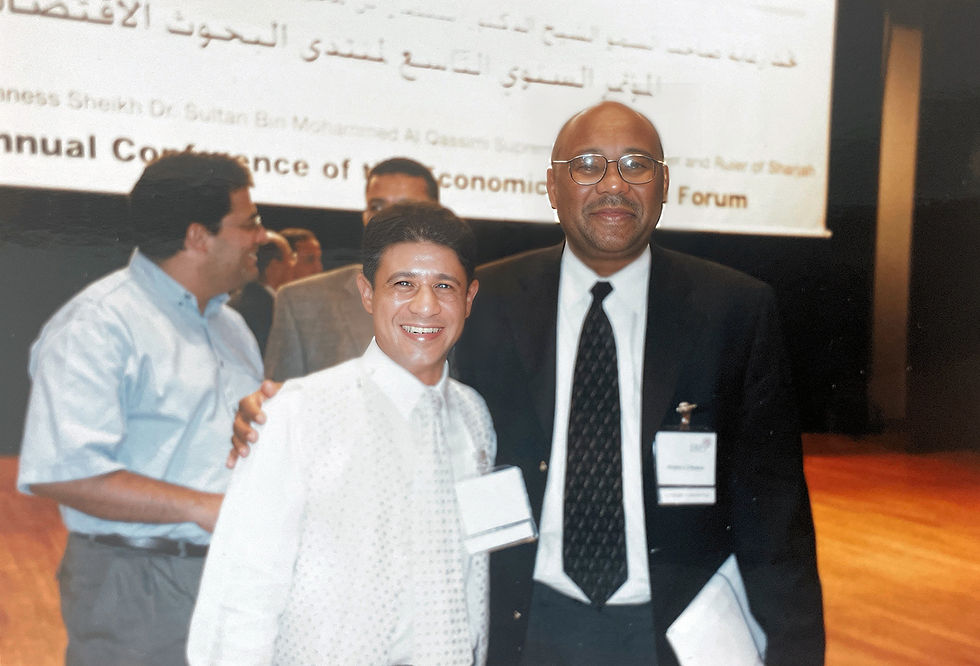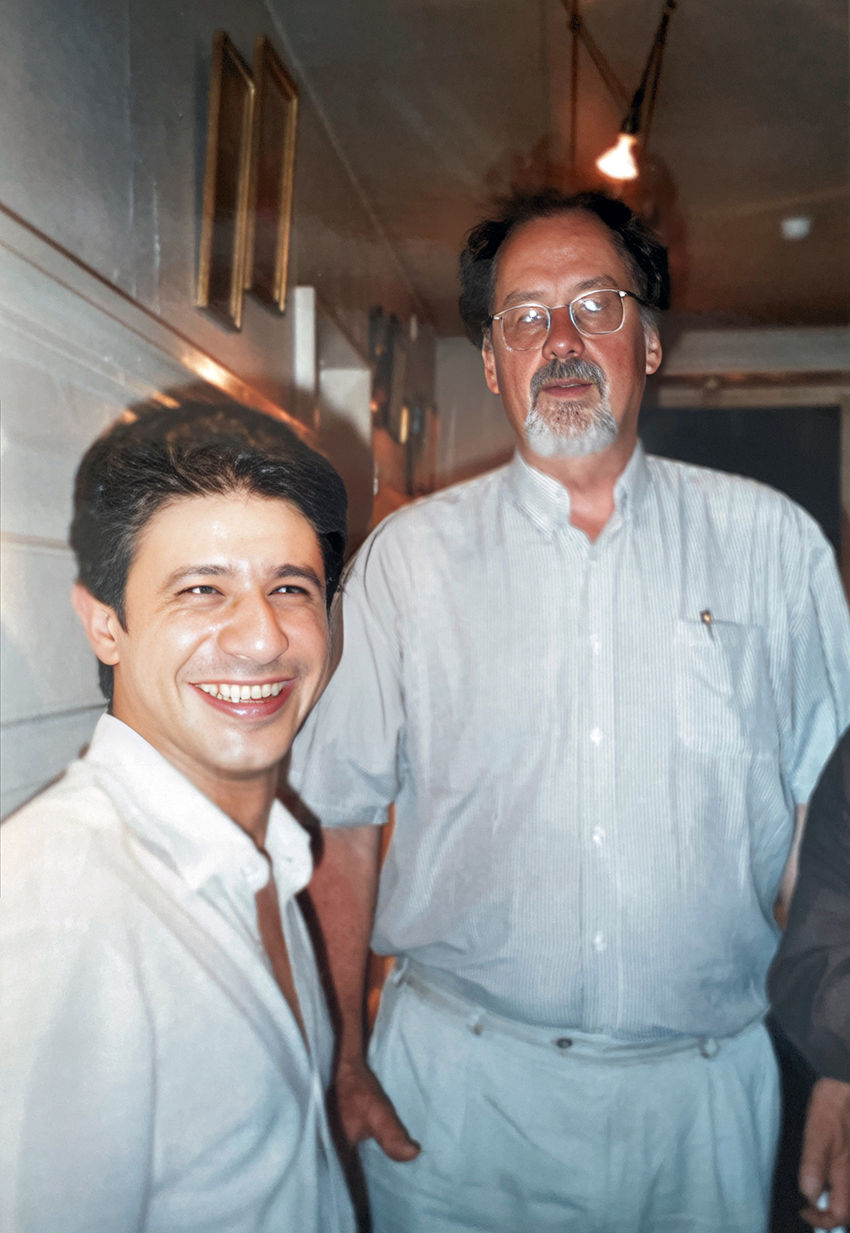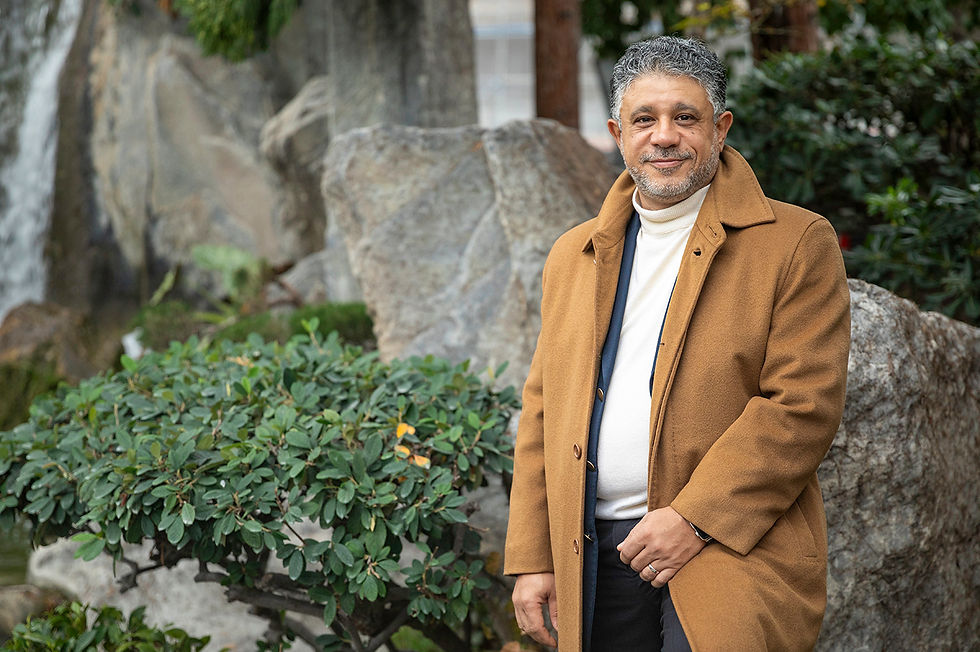BASSEM KAMAR
GEFIC
Can we influence the future of the world? Can we have a clear vision of this future? What long-term economic strategies shall we put in place for the greater good? What guidance those who would like to invest in the Middle East and Africa need? Bassem Kamar created GEFIC, an international economic foresight consultancy company, to join the forces of those who would like to contribute their expertise on addressing such issues. An encounter with an economic scholar who is visionary, humane, and resolutely in action.

Bassem Kamar, photo Dominique Agius
GEFIC – Global Economics & Finance Consulting
Bassem Kamar is an influential and… warm person. The depth of his ideas does not impair in any way his simplicity and his enthusiasm. He recently left the chief economist responsibility at the Central Bank of the United Arab Emirates (CBUAE), following a career as finance and economics consultant for international institutions like the International Monetary Fund (IMF) and the European Bank for Reconstruction and Development (EBRD). He is now dedicating his time to his strategic consultancy company GEFIC – Global Economics and Finance Consulting. I identify myself as economic foresight strategist, I advise governments, policy makers and companies on the implementation of long-term economic strategies. Especially the countries of the Middle East with whose decision-makers I have collaborated for a long time. Renowned for his expertise in economic and monetary strategies, he has profound knowledge of those countries, their cultures, their economic environments and has a network at all levels: entrepreneurial, institutional and political. Bassem collaborates with a base of experts that he has known for quite some time and who share his strong values. We must participate actively in imagining the world of tomorrow. We have to have long-term visions; we have to invent new economic models. For over twenty years, I have been doing research on the economic diversification of the Middle Eastern countries. When a country considers what it has to offer to the world, in the post-oil era, for example, we have to be able to support it, to position ourselves at the highest strategic level and surround ourselves with experts; but we should also be able to identify the extraordinary human, the one capable of bringing the innovation that will change the world. When I exchange ideas with a minister, I understand exactly what the government is aiming for. The GEFIC team that I lead accompanies each project, from its design to its practical implementation, bringing to it technical and human expertise, contributing with all its network throughout the process.
Understanding
This is probably the source of Bassem’s insatiable curiosity and the common denominator of all his projects. His first questions arise in his childhood. The different cultures that I was exposed to when I was very young have certainly forged the person that I have become. He is two-years old when his father, a naval engineer on oil drilling platforms in Port-Said, gets transferred to the Principality of Monaco. Bassem grows up in a protected environment, in a cocoon. He is 9 when he experiences his first cultural shock. His parents decide to send him and his sisters to the French lycée in Cairo to not deprive them from the culture of their home country and to allow them to learn Arabic. Bassem moves back with his mother and sisters to Cairo where he is struck by the poverty and misery in certain neighbourhoods. I wondered about the reason for the huge contrast between these two worlds. The reasons for poverty? I don’t know if this affected my professional ambitions but the desire to act got anchored in me. The rest of his childhood is spent between Egypt and Monaco. It is in Egypt where he obtains his first degree – a Bachelor in business administration, starts his import-export business aged 20 and builds his muscle as entre-preneur. I was young, not always taken seriously. I learned… I am a person of my word; a word is worth a thousand signatures. At the time, the customs duty for importing new cars in Egypt is 200%. As a result, the second-hand car market becomes inaccessible for many Egyptians. Bassem has an idea: I was disassembling cars in France that I purchased from the scrap yards and was exporting them in containers as spare parts to Cairo. Everything can get repaired, I was surrounded by incredibly talented people, who demystified the automobile. I never really stopped buying and selling cars. Indeed, he is today a discerning car collector. One event would put an end to this activity and push him to go back to university: the revision of the GATT agreements, leading, among others, to the reduction of customs duties between Egypt and the European Union. Bassem wants to understand the effect of this event on his business activity and decides to study economics. His career will take a completely different path…
Encounters
The young business owner has no time to waste. At Cairo University the available curriculum is too long for someone who already has a company to manage. A man will change the course of things for him. Claude Berthomieu, professor at the University of Nice-Sophia Antipolis, accepts to receive him and listens attentively to his project. Given his motivation, he allows him to enrol directly in the Master’s program in economics. Claude Berthomieu gave me a chance, he bet on me, on my perseverance. I worked hard and obtained my research master. The quality of his master thesis is unanimously congra-tulated. The jury suggests that he continues his work in a PhD thesis. While looking for a topic, he remembers the encounter with the Tunisian professor Chedli Ayari who taught him the economics of exchange rates and the disastrous effect of their fluctuations during the 1998 Asian crisis. I have the gut feeling that such a crisis can take place in Egypt and I decide to write my PhD on the exchange rate. His fascination with currencies isn’t new. My father travelled around the world and used to bring home currencies from various countries, I was always intrigued by those banknotes, coins and their exchange rates. How is an exchange rate calculated, what should be a currency’s equilibrium rate? Based on these criteria, what are the economic policies to put in place? Bassem finds himself a passion about research which he perceives as a tool to influence in depth the economic reality of a country: it is not enough to find a solution; you have to implement it. I believe that political implications and cooperation are essential for humanity. Bassem participates in numerous international conferences, wins distinctions like the Ibn Khaldun prize of the Middle East Economic Association, and decides to further his knowledge by learning econometrics – the mathematics applied to economics. He meets renown experts in the field like Katarina Juselius and Søren Johansen who recognize the quality of his research. Commended by his tutors: I felt legitimate as researcher. Another important encounter will follow. He is still doing his PhD and wants to teach. The International University of Monaco (IUM) is recruiting a professor of economics. A misunderstanding provokes the next encounter. The dean who welcomes him mistakes him for another candidate and introduces him to the president at that time – Maxime Crener. He first gives him one course... then a full-time job as economics professor, and later the direction of the scientific research at the university.

Bassem Kamar with Ibrahim Elbadawi, Economic Research Forum, Sharjah, October 2002
Transmission
Transmission is a passion… And the basis for all his activities. While cumulating the position of IUM professor, the publications of his scientific research and the conferences around the world, his work is spotted by Ibrahim Elbadawi - at the time, expert with the World Bank – during a conference on exchange rates in Lebanon; he invites him to Washington DC to participate in a joint project aiming at an international publication. Bassem uses this trip to visit the International Monetary Fund; his mentor suggests that he should apply for a position with its training institute. The probability of getting in is very limited, on average 80 candidates are selected among the 18 000 applicants, and during that period specifically there is a hire freeze. Bassem prepares his interview assiduously; I knew that they needed my specific qualifications because being an Arabic speaker was an additional asset. I was hired to teach the IMF economic programs to economists and government officials from Asia, Africa and the Arab world while continuing my research and publication activity. After five years in Washington DC, Bassem feels the need to go back to Monaco and starts a new career as consultant for… the IMF that hires him right away. He undertakes his professional missions from Monaco. It is the era of the Arab Spring. He is solicited by governments and central banks for the implementation of economic reforms. During one such conference in Tunisia, he pays tribute to professor Chedli Ayari and advises to follow his economic policies. Shortly after, Professor Ayari becomes Tunisia’s central bank governor. During this time, I was able to accomplish very practical things, say what I had in mind, it was very enriching. When one of his former IMF colleagues invites him to join the IMF office in Kuwait to train the employees of the central banks and ministries from the entire Arab world, he accepts…

Bassem Kamar with Søren Johansen, Copenhagen, 2004
Visions
In 2018, a new prospect arises. He is recruited by the EBRD to help settle in Cairo its Middle Eastern economic office. An opportunity to return to his home country and to participate, as he has always desired, in large-scale projects. During three years he puts in practice the strategic plan for economic development with a budget of sever billion euros. His absolute priority: inclusion. I have always put the accent on inclusion, it is essential that all people become actors of their own development. Inclusion is built by developing education to give everyone an equal chance, by delocalizing projects to cover all territories, by taking into account the environmental repercussions. Thus, at the EBRD, we created a point system depending on the project’s economic impact, that had an influence on its financing. My priority is also female inclusion. In every project, their participation is non-negotiable. He leads the operations, federates a steering committee among numerous international institutions. The lack of long-term vision of certain country leaders is a hindrance to their development and one of his battle grounds. While establishing a strategic plan, you have to have a vision over fifty years. He finds such a setup by joining the Central Bank of the United Arab Emirates as chief economist in charge of the economic forecasts of the country. The UAE have a clear vision of the future, a very detailed plan until 2071. Take artificial intelligence (AI) for example. In the UAE, they understand that by mastering the topic, they will be among the makers and shakers. They have created the first Ministry of AI in the world, and the first graduate AI university – Mohamed bin Zayed University of Artificial Intelligence (MBZUAI). Last year, they signed hundreds of billion-dollar contracts, with Microsoft among others, to put in place AI in all domains and to set and example for the rest of the world. Helping governments, institutions and business develop a long-term vision, this is the very core of GEFIC’s activity.
Values
Bassem has the soul of a storyteller. GEFIC’s logo tells a story. It is a globe positioned between Africa, Europe and the Middle East on which rests a compass. We guide our clients in a particular individualized direction. The two wings represent navigation, in perfect equilibrium. Ascending allows to think with a larger vision. The vertical arrow indicates that we strive to elevate our clients. The serrated outer strip makes reference to the money coin, Bassem’s specialty. A numismatist, he has published with L’Harmattan a book tracing the origin of money and of exchange rates back to pharaonic times. I am reflecting on a new book on the future of money, on cryptocurrencies, digital currencies… The CBUAE is one of the rare central banks to have emitted a digital currency, it’s exciting. Currencies should participate in the financial inclusion everywhere in the world. Inclusion, indissociable from peace, is a major subject for Bassem who plans on writing a book on this topic as well. We have to reflect upon the things that we have to put in place in order to live in peace. On all levels, individual, collective. Being in peace with oneself and with others; in peace with nature, the environment; put an end to conflicts… If he does not believe in peace happening tomorrow, he dreams of a collective awakening to analyze what doesn’t work and that can be changed. Among the infinite list of his ideas, the use of AI capable of synthesizing 3000 years of literature to help us understand the world…
Intuitions
Bassem is a surprising man, who emanates himself a form of internal peace. He has never had a career plan, his intuition has always guided him. The first time he meets the one who would become his wife, both were students: I knew immediately that she would become my spouse. A huge part of the man I have become, even if she doesn’t admit it, I owe to her. With their children, she follows him in his expatriations, finding a new job every time – she now teaches economic diplomacy at the diplomatic academy of the Emirates. Throughout his journey, Bassem relies on his sixth sense and quite naturally… every position is followed by a new opportunity. Barely has he resigned from the central bank that requests start flowing. A role in coordinating the work of several institutions he knows well for a local government, helping a company set up in a Middle Eastern pharmaceutical industry, strategic planning for the development of a French tech start-up in the Gulf countries… Ambitious plans a plenty. Modern day nomad, based between Abu Dhabi, Cairo, Monaco and Paris, Bassem takes a new route, pilots his own speedster, an expert in the mechanics of dynamic equilibrium… He follows his path in harmony with his convictions, no doubt, this man is not done making sparkles. In this vein, he was just nominated economic advisor of the new Egyptian party: the Awakening. One more step of his intention to act fervently for a better world…

Bassem Kamar, photo Dominique Agius